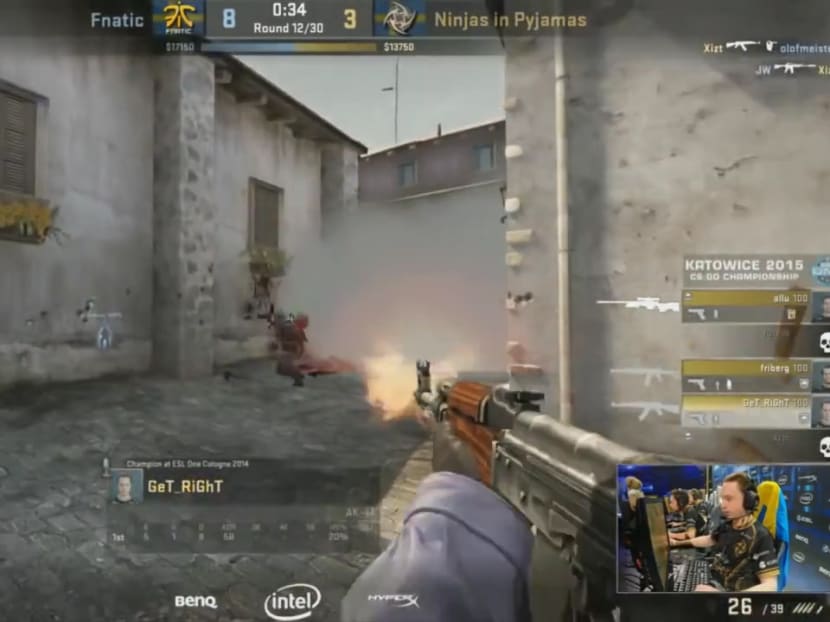Professional video gaming faces up to underage gambling problem
LONDON — The stadium seating is full, the 500-strong audience lit fire red and ice blue. Gamescom, held annually in Cologne, Germany, is Europe’s largest video game fair. This game of Counter-Strike: Global Offensive, a popular first-person shooter, is its big draw.

Weapons can be boosted and customised in-game using add-ons known as skins Photo: ESL
LONDON — The stadium seating is full, the 500-strong audience lit fire red and ice blue. Gamescom, held annually in Cologne, Germany, is Europe’s largest video game fair. This game of Counter-Strike: Global Offensive, a popular first-person shooter, is its big draw.
A sound system broadcasting play-by-play commentary is almost drowned out by the noise of on-screen gunshots and grenade blasts. A successful play brings gasps and whoops. Nails are bitten, the action watched through fingers.
There are whispers of a darker side to “eSports,” though: admissions of performance-enhancing drug use and, now, allegations of unregulated and underage gambling.
Professional eSports is growing exponentially. It’s worth an estimated US$612 million (S$873 million) a year, according to research provider Superdata, and is full of committed players and obsessive fans. Twitch, an online platform that live-streams gameplay, tells advertisers it has 100 million monthly viewers, who watch for an average of 106 minutes a day.
In July, though, Kory Friesen, a Counter-Strike player known as “Semphis,” told an interviewer that he and team-mates “were all on Adderall,” a stimulant typically used to treat attention-deficit hyperactivity disorder, during a competition in Poland. He then told the New York Times that did not necessarily make his team win: “You don’t just take Adderall and instantly become better,” Friesensaid.Hedid not reply when asked to comment by Bloomberg.
Shortly afterwards the Electronic Sports League, one of the main tournament organisers, said it would create a formal drug policy with help from Germany’s anti-doping agency. It conducted its first doping tests at a tournament in Cologne in August, and said in a statement the random screening “returned negative results for all tested players.” A spokeswoman declined to disclose how many tests were conducted, and for which substances.
‘Underage kids are betting and there is no way to control it.’
Though eSports organisers are beginning to grapple with drug use, gambling presents a new set of challenges. Betting on competitions is growing rapidly on mainstream sites; UK bookmaker William Hill has taken 14,000 bets on games so far this year, spokesman Joe Crilly said, of about 250,000 (US$395,000) in total. Four times that much will likely be bet over the next year, he said.
This kind of gambling — licensed, regulated, and by adults, is generally accepted in eSports. There is growing concern, though, that teenagers are being attracted to different forms of betting facilitated by third-party providers.
One such platform is CSGO Lounge (an independent site not affiliated with Valve Software, which develops the game itself). The site allows spectators to bet in-game add-ons known as skins — weapons, tools and the like — on the results of matches. Not all skins are created equal, and the rarity of some means they can cost hundreds of real dollars on marketplace sites like SkinXchange.com. The temptation is too much for some.
“Underage gambling is a huge problem,” SkinXchange lead developer Justin Carlson said in an e-mail, adding that he has had to call “countless” parents whose children have taken their credit cards without their knowledge. They use the cards to buy skins and bet on gaming on other sites. Many have “racked up hundreds or thousands of dollars in skins on SkinXchange just to lose them all on some betting or jackpot site,” Carlson said.
Access to the skins on third-party sites is enabled by a system called Steam, also developed by Valve Software. Valve and its co-founder and managing director Gabe Newell did not respond to requests for comment.
Online gambling is illegal in many European countries and CSGO Lounge does not appear on the register of approved gambling providers in France or the UK, which do permit some online betting. Neither does EGB.com, a Costa Rica-based site that also allows users to bet on eSports using real money.
CSGO Lounge says on its web site that placing a bet represents a confirmation you are “in abidance with your country’s laws” regarding gambling, including minimum age. EGB, for its part, asks users to tick a box confirming they’re of legal age. Neither site responded to multiple requests for comment for this story.
The UK Gambling Commission, which regulates betting, declined to comment on individual providers but said any site offering gambling services to British residents must be registered.
“It really is a grey area,” said Mr Tomas “Morte” Kerbush, a professional gamer who plays Battlefield 4, another popular first person shooter. His team-mate Erik “2-Easy” Van Hoorn was more explicit: “Underage kids are betting and there is no way to control it.”
Mr Wouter Sleijffers is the CEO of Fnatic, one of Europe’s biggest and most successful progamming teams. He also describes unchecked gambling as a problem that the industry needs to tackle.
“Teenagers’ gambling should be prevented,” he said.
“Esports has seen a gradual development of people trading skins. It’s something that grew organically. We are now at the point where it should be regulated like in other industries.” BLOOMBERG





